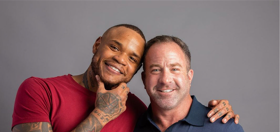 The National Coalition of Anti-Violence Programs (NCAVP) today released a report on hate violence against LGBT, queer and HIV+ people in the United States. Taking 2011 data from 16 anti-violence programs in 16 states, the study found some surprising results:
The National Coalition of Anti-Violence Programs (NCAVP) today released a report on hate violence against LGBT, queer and HIV+ people in the United States. Taking 2011 data from 16 anti-violence programs in 16 states, the study found some surprising results:
- In 2011, NCAVP documented 30 anti-LGBTQH murders, the highest yearly total ever recorded by the coalition. This is an 11% increase from the 27 people murdered in 2010. This high murder rate continues a multi-year trend of increases in anti-LGBTQH murders over the past three years of reporting.
- 87% of the 30 reported hate murder victims in 2011 were LGBTQH people of color. For a second year in a row, this reflects a disproportionate targeting of people of color for severe and deadly violence and is an increase over 2010 where 70% of the 27 reported hate murder victims were LGBTQH people of color.
- Transgender women made up 40% of the 30 reported hate murders in 2011, while representing only 10% of total hat- violence survivors and victims. This was comparable to last year’s report where transgender women made up 44% of the 27 reported hate murders, reflecting a two-year trend toward disproportanate and severe violence faced by transgender women.
- Youth and young adults between the ages of 18 and 30 years old were 2.41 times as likely to experience physical violence compared to LGBTQH people age 30 and older.
- In 2011, NCAVP reported 16% fewer incidents of hate violence. Many members saw a decline in reports of violence linked to a corresponding increase in murders, indicating attacks aren’t declining, merely becoming more vicious.
“Murders of LGBTQ people have increased over the last three years, indicating a pattern of escalating violence against LGBTQ and HIV-affected people,” said the L.A. Gay & Lesbian Community Center’s Jake Finney. “Those most at risk for murder are transgender and gender non-conforming people, people of color, and gay men.”
These are alarming statistics, to be sure. But it might not be all doom and gloom. It’s possible the rising numbers indicate more victims and families feel comfortable reporting hate violence and murders, and that more resources have become available to track such incidents.
The report’s specific policy recommendations include funding more violence-prevention programs and educating police in responding to LGBT victims.
How about we take this to the next level?
Our newsletter is like a refreshing cocktail (or mocktail) of LGBTQ+ entertainment and pop culture, served up with a side of eye-candy.


















Me
How many more letters can we add!? And no offense, but if we keep saying hiv isn’t a gay disease why append it to an already too long acronym?
EdWoody
What this says is that while society at large is getting more accepting, the lunatic fringe are getting ever more lunatic and fringey. As they sense they are losing the war, they fight all the harder. And we bear the brunt of their insanity.
mc
@Me: Huffpo had a survey asking if they should add asexuals & polyamory , so it seems there’s potential for more letters to be added.
QJ201
H= “HIV effected”
Just like bisexuals and trans folks, not all HIV positive people consider themselves part of the gay community, in fact some resent being lumped in with us queers.
STOP ADDING DAMN LETTERS.
LGQ and leave it at that.
Rakkaus
@QJ201
I agree with you that H doesn’t really belong attached to LGBTQ. Certainly we should take notice of and care about victims of violence being targeted for their HIV+ status, but it’s really not comparable to a sexual orientation or gender identity.
But just because bi or trans folks might not consider themselves part of the gay community (because they AREN’T gay, they’re bi or trans), doesn’t mean they are not part of the wider queer/ LGBTQ community. “Gay” is often used to refer to the entire LGBTQ community when in fact a more correct and inclusive term like “queer” should be preferred.
LGBTQ seems like a fair compromise compared to LGBTQQIAPPG or whatever other new categories people are thinking up to include.
jason
But, but, but I thought Dan Savage said “It Gets Better”. Why aren’t things getting better, Dan? Maybe it’s because your publicity stunt is a gross distortion of what is actually happening out there, Dan.
mc
I don’t think It Gets Better campaign was about murder & crime rate. But some of that apparently gets better as you get older as per the article; “Youth and young adults… were 2.41 times as likely to experience physical violence compared to LGBTQH people age 30 and older.” Also :”n 2011, NCAVP reported 16% fewer incidents of hate violence.”
Also I’m not seeing how Dan is somehow responsible for the murder rate
Alexi3
A ban on hate speech from the pulpit would be a step in the right direction. Tell them they will lose their tax-exempt status until they stop and see how inclusive they quickly become.
Alexi3
@jason: You really can come up with the most ridiculous statements. As pointed out “It Gets Better” is about as you get older things get better and less out of poportion and this data seems to help substantiate the claim.
Toby
When someone hates you enough to murder you because of your sexuality or HIV status, I think they’re *exactly* the sort of people that consider HIV a “gay disease”. Probably has quite a lot to do with why they’re killing them and not, say, those infected with tuberculosis.
They’re also the sort of people that consider transwomen attracted to men “gay”, so even if *you* may not wish to associate yourselves with them, you’re still being hated for the same reason, to the murdering sort of homophobes. It doesn’t matter what you think, it matters what those committing the violence think. Saying “I’m not like them!” isn’t likely to lead to a discussion on terminology with your potential murderer.
stephen foreman
We As Individuals Are Not To Point Our Fingers,And Say Look He Or She Is Such A Way,Or This Way:Unless We Are Will To Be A Help As The The Lord God Jesus The Christ Uses Us To Be Just That!!!!!!! Homosexuality Is An Evil,Spirit,Aswell As All Of The Others Such As Lesbianism,And Bisexualism As Aswell As All Others,And The Word Of The Lord God Jesus The Christ Is Saying Right Now That He Did Not Make Any Homosexual Men Lesbian Women,Or Bisexual Men,And Women Because His Word Says That We Wrestle Not Against Flesh,And Blood:But Against Pricipalities,Powers,Against Rulers Of This World,And Against Spiritual Witnesses In High Places !!!!!!!
stephen foreman
The Hate That The Union Is In Is Directed Towards The Lord God Jesus The Christ,When The True Fact Of The Matter Is We All Need To Be Running For Our Lives From Satan The Devil Who Is Not Playing At All Because He Has Came To Steal,Murder,And Destroy Anyone That He Can !!!!!!!